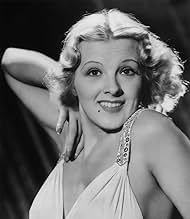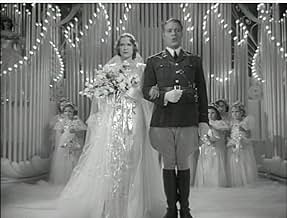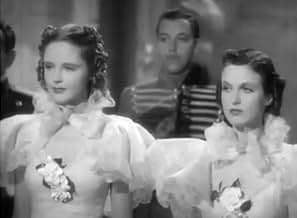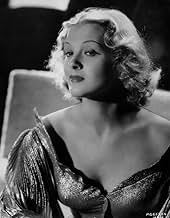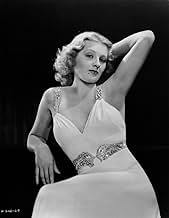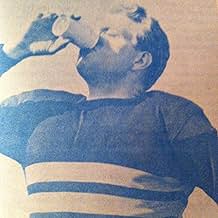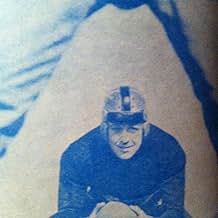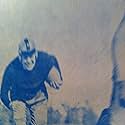Agrega una trama en tu idiomaWest Point cadet Dick Thorpe falls in love with a girl, who turns out to be a princess from an European kingdom.West Point cadet Dick Thorpe falls in love with a girl, who turns out to be a princess from an European kingdom.West Point cadet Dick Thorpe falls in love with a girl, who turns out to be a princess from an European kingdom.
- Dirección
- Guionistas
- Elenco
- Premios
- 1 premio ganado en total
Carol Adams
- Dancer
- (sin créditos)
Kay Aldridge
- Lady in Waiting
- (sin créditos)
Opiniones destacadas
Take a major studio studio (MGM) celebrated for its musicals. Take a top director (Woody Van Dyke) known for his breezy direction of films like THE THIN MAN, SAN FRANCISCO and NAUGHTY MARIETTA, among many others. Take a handsome singing star (Nelson Eddy) who was the studio's biggest matinee idol at the time, getting more fan mail than Clark Gable. Take a charming young tap-dancing star (Eleanor Powell). Take a score by Cole Porter written especially for the picture, including `In the Still of the Night.' Add some popular supporting actors like Frank Morgan, Ray Bolger, and Edna May Oliver, and, for those few who find a professional sneezer amusing, Billy Gilbert.
Take all these elements, spend a small fortune on sets and costumes, and turn out a picture which is among the worst ever made. It's inexplicable. The full-throated Eddy has been turned into a crooner, playing the world's oldest (36) West Point Cadet. Powell's dancing is sprightly but the big centerpiece number, danced on a series of huge drums, can only be called bizarre, Poor Frank Morgan is forced to do most of his performing with a ventriloquist's dummy. There are one or two cute scenes---Powell and Eddy obviously like each other---but mainly this picture is simply awful. What a waste.
Take all these elements, spend a small fortune on sets and costumes, and turn out a picture which is among the worst ever made. It's inexplicable. The full-throated Eddy has been turned into a crooner, playing the world's oldest (36) West Point Cadet. Powell's dancing is sprightly but the big centerpiece number, danced on a series of huge drums, can only be called bizarre, Poor Frank Morgan is forced to do most of his performing with a ventriloquist's dummy. There are one or two cute scenes---Powell and Eddy obviously like each other---but mainly this picture is simply awful. What a waste.
5B24
Writing comments about a movie like this one is difficult. The plot and dialogue are atrocious, but the score and visuals are first rate. So one splits the difference and gives it a "5." As some of the few comments thus far have implied, it is a formulaic comedy with loads of prominent character actors of the time reprising roles already played in other movies and on the radio. Audiences in 1937 were for the most part captive to that sort of thing. Diversity of tastes like that of today just did not exist, and everyone going to the movies in small-town America was inclined to go along with the gag mainly because it was literally the only show in town.
When as a lad I paid my 9 cents admission at the box office, I knew I was going to sit through anything they threw at me, including the newsreel at the beginning, the same old cartoons, a dumb serial episode with someone falling off a moving train at the end -- to be continued -- and a main feature in black-and-white that depended more on stock characters and situations than on anything new or scandalous.
Now I watch these same features on Turner Classic Movies with moody nostalgia and total suspension of disbelief. So what if Nelson Eddy at nearly 40 was playing a cadet of half that age? And what about my now knowing that his off-screen person was 180 degrees off the roles he played? His singing is still mesmerizing, an operetta voice the likes of which disappeared ages ago -- indeed a relic of the Nineteenth Century. Even an uncharacteristically inferior Porter tune like "Rosalie" gets a high-class treatment.
Sure, there are better musicals from the 30's, but this one is a piece of history as well as a minor work of art.
When as a lad I paid my 9 cents admission at the box office, I knew I was going to sit through anything they threw at me, including the newsreel at the beginning, the same old cartoons, a dumb serial episode with someone falling off a moving train at the end -- to be continued -- and a main feature in black-and-white that depended more on stock characters and situations than on anything new or scandalous.
Now I watch these same features on Turner Classic Movies with moody nostalgia and total suspension of disbelief. So what if Nelson Eddy at nearly 40 was playing a cadet of half that age? And what about my now knowing that his off-screen person was 180 degrees off the roles he played? His singing is still mesmerizing, an operetta voice the likes of which disappeared ages ago -- indeed a relic of the Nineteenth Century. Even an uncharacteristically inferior Porter tune like "Rosalie" gets a high-class treatment.
Sure, there are better musicals from the 30's, but this one is a piece of history as well as a minor work of art.
Eleanor Powell stars with Nelson Eddy, Ray Bolger, Edna May Oliver, and Frank Morgan in "Rosalie" from 1937.
The original music by Romberg and Gershwin was scrapped, and a new score was written by Cole Porter, which is very nice with the title song and "In the Still of the Night" the major songs that come out of it.
The plot is nothing unusual. A Princess (Powell) comes to America, where she hides her identity. She falls for a football playing cadet Dick Thorpe (Nelson Eddy, probably 15 years too old). Then she has to return to her country, Romanza, where she is betrothed to another. Dick follows her there along with his friend Bill (Bolger) whose girlfriend has dumped him.
I have to say that for me, this was Nelson Eddy's best singing - he showed more of his higher range and also demonstrated the ability to sing a high tessitura - I'm not trying to be a snob, that just means that even if music is consistently high, he can sing it. Not everyone can. This movie really made me wonder if there might have been a heldentenor lurking there someplace. Acting-wise he was pretty wooden. I never cared, not with that voice.
Eleanor Powell was delightful, both in her acting and great dancing.
Edna May Oliver is the domineering queen and Morgan is the bumbling King. Truthfully I really only was interested in the singing and dancing. And there was plenty of it, and some amazing sets.
The original music by Romberg and Gershwin was scrapped, and a new score was written by Cole Porter, which is very nice with the title song and "In the Still of the Night" the major songs that come out of it.
The plot is nothing unusual. A Princess (Powell) comes to America, where she hides her identity. She falls for a football playing cadet Dick Thorpe (Nelson Eddy, probably 15 years too old). Then she has to return to her country, Romanza, where she is betrothed to another. Dick follows her there along with his friend Bill (Bolger) whose girlfriend has dumped him.
I have to say that for me, this was Nelson Eddy's best singing - he showed more of his higher range and also demonstrated the ability to sing a high tessitura - I'm not trying to be a snob, that just means that even if music is consistently high, he can sing it. Not everyone can. This movie really made me wonder if there might have been a heldentenor lurking there someplace. Acting-wise he was pretty wooden. I never cared, not with that voice.
Eleanor Powell was delightful, both in her acting and great dancing.
Edna May Oliver is the domineering queen and Morgan is the bumbling King. Truthfully I really only was interested in the singing and dancing. And there was plenty of it, and some amazing sets.
A film with the likes of Frank Morgan in support, a wonderful tap dancer such as Eleanor Powell and Nelson Eddy who possessed perhaps the most beautiful baritone voice on film does promise a fair bit. Sadly this promise is not exactly lived up to and it is one of those films that is difficult to rate. There are some definite good things. It is a very sumptuous film in the costumes and sets and it's beautifully shot. The music features a pleasant score from Cole Porter and the song In the Still of the Night is a catchy and beautiful song, while the choreography dazzles in energy(very like how Ilona Massey dazzles in her beauty)- especially in the title number- providing the film's best moments. Eddy sings divinely and Powell's tap dancing is equally a wonder, in support Frank Morgan is amusingly bumbling and Edna May Oliver is her usual solid self. Ray Bolger is however wasted and not funny at all, agreed that stupid is more like it, and Billy Gilbert's shtick here comes across as crass. While Eddy is on top form vocally, he is stiff and looks miserable, not showing much chemistry with Powell excepting some cute moments. The script is lacking in wit, sometimes soppy, sometimes crass and veers on bizarre. And while the story has great song and dance numbers and nice likable moments in the first half, it is mostly dull, predictable and the second half(not helped by an overly-sappy and underdeveloped romance) just doesn't engage. All in all, a mixture of good and bad, not easy to rate. 5/10 Bethany Cox
Rosalie marked Nelson Eddy's first starring film without Jeanette MacDonald. That being the case MGM certainly didn't want Mr. Eddy to wander too far afield. If Nelson couldn't swap high notes with his co-star Eleanor Powell than at least all the kittenish banter that also characterized the Eddy-MacDonald movies was certainly left in tact.
MGM obviously bought this property after looking at the success Warner Brothers was having with Dick Powell in Flirtation Walk and Shipmates Forever. Powell was in his mid 30s when he did those roles as a cadet and midshipman respectively. Nelson Eddy was also in his 30s, in fact three years older than Dick Powell. But he looks like a man in his 30s and doesn't quite come off believably as a cadet.
That being said, movie audiences came to hear Nelson Eddy sing and MGM which scrapped the original score which was done by both Sigmund Romberg and George Gershwin, got Cole Porter to write a new one. And it's a good one. The title song Rosalie became a big hit, recorded by a number of artists and the classic In the Still of the Night is from this film. Oddly enough, probably because Nelson Eddy was so identified with operetta, these two Cole Porter songs never became identified with him per se.
Nelson also got the infinitely more talented Eleanor Powell as a co-star where Powell had Ruby Keeler for both his movies. MGM went whole hog on glamour with her numbers, probably the most spectacular she ever did on screen. She's also far more believable as a princess than Eddy as a cadet.
Supporting Eddy as his best friend and fellow cadet was Ray Bolger who has one dance number near a crate of fireworks which he accidentally sets off and sets off an revolution. Movies never knew quite what to do with Bolger. He certainly didn't have the look of a hero and most of his film roles were comedic supporting parts. On Broadway he was a big star and was the lead in such great hits as On Your Toes, By Jupiter, Charley's Aunt and The All American, only Charley's Aunt of which he did on screen.
Of course no one can talk about the supporting cast without mentioning two of the great players in studio era Hollywood. Frank Morgan and Edna May Oliver played off each other beautifully as Eleanor Powell's parents, the King and Queen of Romanza. Horsefaced faced Edna May Oliver played so many harridans in her career she practically took a patent out on those parts. That was one formidable lady on screen.
Complementing her completely was Frank Morgan's also copyrighted picture of befuddlement. Having read enough history to know that a whole lot of monarchs WERE as confused and befuddled as Morgan, lends a ring of authenticity to his role. He appeared almost exclusively for MGM in his career and was never bad in anything he did.
Rosalie was a prime example of the delightful nonsense that Hollywood used to do so well.
MGM obviously bought this property after looking at the success Warner Brothers was having with Dick Powell in Flirtation Walk and Shipmates Forever. Powell was in his mid 30s when he did those roles as a cadet and midshipman respectively. Nelson Eddy was also in his 30s, in fact three years older than Dick Powell. But he looks like a man in his 30s and doesn't quite come off believably as a cadet.
That being said, movie audiences came to hear Nelson Eddy sing and MGM which scrapped the original score which was done by both Sigmund Romberg and George Gershwin, got Cole Porter to write a new one. And it's a good one. The title song Rosalie became a big hit, recorded by a number of artists and the classic In the Still of the Night is from this film. Oddly enough, probably because Nelson Eddy was so identified with operetta, these two Cole Porter songs never became identified with him per se.
Nelson also got the infinitely more talented Eleanor Powell as a co-star where Powell had Ruby Keeler for both his movies. MGM went whole hog on glamour with her numbers, probably the most spectacular she ever did on screen. She's also far more believable as a princess than Eddy as a cadet.
Supporting Eddy as his best friend and fellow cadet was Ray Bolger who has one dance number near a crate of fireworks which he accidentally sets off and sets off an revolution. Movies never knew quite what to do with Bolger. He certainly didn't have the look of a hero and most of his film roles were comedic supporting parts. On Broadway he was a big star and was the lead in such great hits as On Your Toes, By Jupiter, Charley's Aunt and The All American, only Charley's Aunt of which he did on screen.
Of course no one can talk about the supporting cast without mentioning two of the great players in studio era Hollywood. Frank Morgan and Edna May Oliver played off each other beautifully as Eleanor Powell's parents, the King and Queen of Romanza. Horsefaced faced Edna May Oliver played so many harridans in her career she practically took a patent out on those parts. That was one formidable lady on screen.
Complementing her completely was Frank Morgan's also copyrighted picture of befuddlement. Having read enough history to know that a whole lot of monarchs WERE as confused and befuddled as Morgan, lends a ring of authenticity to his role. He appeared almost exclusively for MGM in his career and was never bad in anything he did.
Rosalie was a prime example of the delightful nonsense that Hollywood used to do so well.
¿Sabías que…?
- TriviaThe singing voice of Eleanor Powell was dubbed by Marjorie Lane (uncredited).
- ErroresDuring the 'drum dance' sequence there are three rows of huge drums all sounding together. The drum sticks on the front row are synchronized so that they all hit the drum at the same time. The drum sticks in the second and third rows are out of synch with the first row yet their sound is in synch.
- ConexionesEdited into Hollywood: The Dream Factory (1972)
- Bandas sonorasRosalie
(1937) (uncredited)
Written by Cole Porter
Played during the opening credits and as background music often
Sung by Nelson Eddy
Danced by Eleanor Powell on a set of giant drums at the festival
Reprised by Nelson Eddy at the end
Selecciones populares
Inicia sesión para calificar y agrega a la lista de videos para obtener recomendaciones personalizadas
- How long is Rosalie?Con tecnología de Alexa
Detalles
Taquilla
- Presupuesto
- USD 2,000,000 (estimado)
- Tiempo de ejecución2 horas 3 minutos
- Color
- Relación de aspecto
- 1.37 : 1
Contribuir a esta página
Sugiere una edición o agrega el contenido que falta

Principales brechas de datos
By what name was Rosalie (1937) officially released in India in English?
Responda

